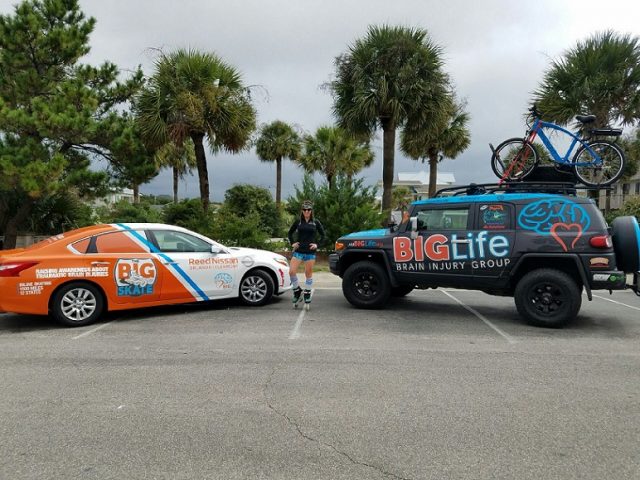By Donald Wittkowski
So far, Merideth McDonald has completed about 900 miles of her 1,400-mile road trip from her home in New Smyrna Beach, Fla., to Boston.
No one should make the mistake of thinking that the remaining 500 miles — including a scheduled stop Saturday in Ocean City — should be a breeze. She is not driving. She is roller-blading her way along the roads as part of a campaign to raise money for brain-injury survivors.
The 33-year-old McDonald said her intense pain from roller-blading so many miles has given her an even deeper understanding of the suffering and struggles experienced by people who are coping with brain injury.
“I knew every day that I would fight the pain,” she said. “I have pain in parts of my body I didn’t even know I had. It rattles everything in you — in your mouth, your teeth and your head.”
McDonald and her husband, Nate, are the founders of BIG Life, a nonprofit that supports brain-injury survivors, their families and their caregivers.
She left New Smyrna Beach on Sept. 10 in a quest to raise $500,000 for BIG, an acronym for Brain Injury Group. Oct. 14 is the date she hopes to arrive in Boston.
Her entire trip will take McDonald through 12 states. Much of her roller-blading is done on back roads or rural routes during off-peak hours for motor vehicle traffic. Often, she is skating between 4 a.m. and 9 a.m., she said.
If the weather cooperates, she plans to spend Saturday and Sunday roller-blading on the Ocean City Boardwalk to raise money and public awareness of brain injuries.
“Brain injury is a huge thing. Two million people a year, or one every 21 seconds, will get a brain injury,” McDonald said, noting that falls are the biggest cause.
It was her husband’s own severe brain injury that inspired her to form BIG Life. He was struck and nearly killed by a garbage truck in 2009 while riding his motorcycle.
“His brain injury was devastating,” McDonald recalled in a telephone interview Friday. “I was advised on a number of occasions to disconnect his life support.”
Her husband eventually awoke from his coma, beginning an arduous recovery that saw him have to relearn basic life functions such as eating, talking and walking. McDonald was his caregiver.
“It was like he was a baby,” she said. “He had to learn all those things again.”
McDonald said her 34-year-old husband now functions at an extremely high level. They have chosen to end the fundraising skate in Boston because it was Boston’s Brigham Young Hospital that saved his life after the accident.
“It you met Nate, you would never know he even had a brain injury,” McDonald said.
McDonald explained that brain injuries not only cause severe physical pain, but also an array of mental and emotional changes that can leave people feeling isolated.
“People feel isolated all along and don’t know who they are,” she said.
She hopes her fundraising skate will start a public dialogue about brain injuries.
“Brain injury is referred to as a silent epidemic, because people don’t want to talk about it,” she said.






